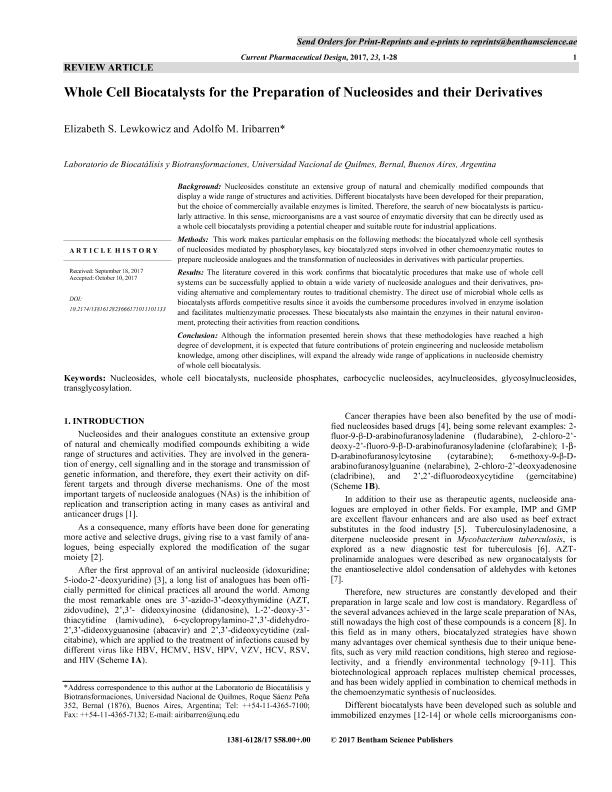Mostrar el registro sencillo del ítem
dc.contributor.author
Lewkowicz, Elizabeth Sandra

dc.contributor.author
Iribarren, Adolfo Marcelo

dc.date.available
2018-04-09T17:36:16Z
dc.date.issued
2017-10
dc.identifier.citation
Lewkowicz, Elizabeth Sandra; Iribarren, Adolfo Marcelo; Whole cell biocatalysts for the preparation of nucleosides and their derivatives; Bentham Science Publishers; Current Pharmaceutical Design; 23; 45; 10-2017; 1-28
dc.identifier.issn
1381-6128
dc.identifier.uri
http://hdl.handle.net/11336/41345
dc.description.abstract
Nucleosides constitute an extensive group of natural and chemically modified compounds that display a wide range of structures and activities. Different biocatalysts have been developed for their preparation, but the choice of commercially available enzymes is limited. Therefore, the search of new biocatalysts is particularly attractive. In this sense, microorganisms are a vast source of enzymatic diversity that can be directly used as whole cell biocatalysts providing a potential cheaper and suitable route for industrial applications.
Methods: This work makes particular emphasis on the following methods: the biocatalyzed whole cell synthesis of nucleosides mediated by phosphorylases, key biocatalyzed steps involved in other chemoenzymatic routes to prepare nucleoside analogues and the transformation of nucleosides in derivatives with particular properties.
Results: The literature covered in this work confirms that biocatalytic procedures that make use of whole cell systems can be successfully applied to obtain a wide variety of nucleoside analogues and their derivatives, providing alternative and complementary routes to traditional chemistry. The direct use of microbial whole cells as biocatalysts affords competitive results since it avoids the cumbersome procedures involved in enzyme isolation and facilitates multienzymatic processes. These biocatalysts also maintain the enzymes in their natural environment, protecting their activities from reaction conditions.
Conclusion: Although the information presented herein shows that these methodologies have reached a high degree of development, it is expected that future contributions of protein engineering and nucleoside metabolism knowledge, among other disciplines, will expand the already wide range of applications in nucleoside chemistry of whole cell biocatalysis.
dc.format
application/pdf
dc.language.iso
eng
dc.publisher
Bentham Science Publishers

dc.rights
info:eu-repo/semantics/openAccess
dc.rights.uri
https://creativecommons.org/licenses/by-nc-sa/2.5/ar/
dc.subject
Nucleosides
dc.subject
Whole Cell Biocatalysts
dc.subject
Nucleoside Phosphates
dc.subject
Carbocyclic Nucleosides
dc.subject
Acylnucleosides
dc.subject
Glycosylnucleosides
dc.subject
Transglycosylation
dc.subject.classification
Biotecnología Industrial

dc.subject.classification
Biotecnología Industrial

dc.subject.classification
INGENIERÍAS Y TECNOLOGÍAS

dc.title
Whole cell biocatalysts for the preparation of nucleosides and their derivatives
dc.type
info:eu-repo/semantics/article
dc.type
info:ar-repo/semantics/artículo
dc.type
info:eu-repo/semantics/publishedVersion
dc.date.updated
2018-04-09T15:19:58Z
dc.journal.volume
23
dc.journal.number
45
dc.journal.pagination
1-28
dc.journal.pais
Estados Unidos

dc.journal.ciudad
Oak Park
dc.description.fil
Fil: Lewkowicz, Elizabeth Sandra. Universidad Nacional de Quilmes. Departamento de Ciencia y Tecnología. Area Química. Laboratorio de Biotransformaciones; Argentina. Consejo Nacional de Investigaciones Científicas y Técnicas; Argentina
dc.description.fil
Fil: Iribarren, Adolfo Marcelo. Universidad Nacional de Quilmes. Departamento de Ciencia y Tecnología. Area Química. Laboratorio de Biotransformaciones; Argentina. Consejo Nacional de Investigaciones Científicas y Técnicas; Argentina
dc.journal.title
Current Pharmaceutical Design

dc.relation.alternativeid
info:eu-repo/semantics/altIdentifier/url/http://www.eurekaselect.com/156338/article
dc.relation.alternativeid
info:eu-repo/semantics/altIdentifier/doi/http://dx.doi.org/10.2174/1381612823666171011101133
Archivos asociados
